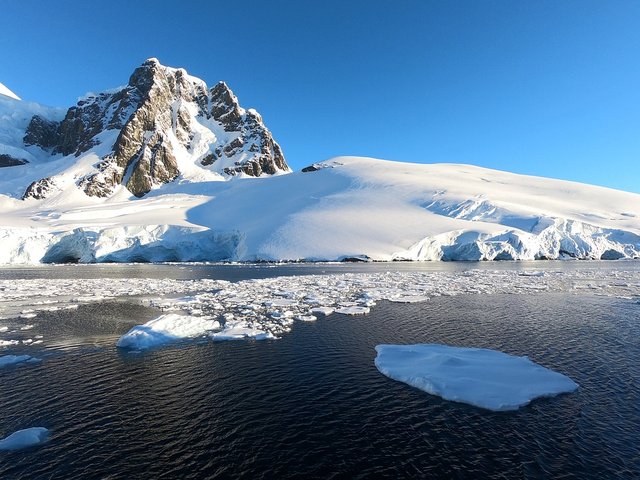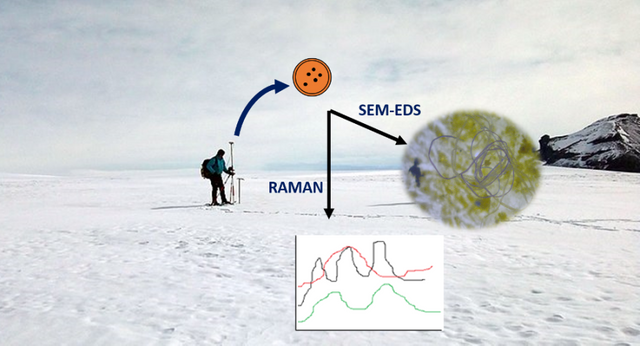As we all know, plastics are causing serious environmental pollution problems, not only because they have a long life span, which makes them persistent in the environment, but also because they are fragmented into small pieces due to its degradation by the action of the sun and the elements, these small pieces consisting of particles that reach even less than 5 mm in size, called microplastics, which are very dangerous for marine wildlife, as they consume them mistaking them for food, thus entering the food chain.
The biggest problem of these microplastics is that they are easily transported by the wind and ocean currents, reaching places where we would think it impossible to find plastic waste, and in fact, recently researchers from the University of Zaragoza and the Complutense University of Madrid detected for the first time microplastics in the atmosphere of Antarctica.

For the first time microplastics are found in the Antarctic atmosphere. Source: pixabay.com.
This group of researchers was able to find the presence of polystyrene fibers, as well as other anthropogenic aerosols, including ammonium nitrate, syngenite and nitrogen, phosphorus and potassium fertilizers. The results of the research were published in the journal Spectrochimica Acta Part A: Molecular and Biomolecular Spectroscopy, and have shown how microplastics and other pollutants are able to travel to some of the most remote locations, perhaps from nearby populated areas or due to heavy maritime traffic.
The contaminants were found by means of air filters, subsequently performing a non-destructive spectroscopic characterization of the particulate matter found in the filters; samples of particulate matter in the air and soil were collected in the surroundings of the Spanish Antarctic Research Station located in Deception Island, one of the purest places on the planet.
The characterization of the content of the filters was performed by Raman spectroscopy (RS) and scanning electron microscopy with energy dispersive X-ray spectroscopy (SEM-EDS), being able to determine the elemental and molecular composition of each of the particles captured in the air and taken from the ground. The resulting spectra using these techniques allowed us to establish the presence of plastic compounds such as polystyrene, as well as black carbon particles and minerals such as polyhalite, arcanite, ammonium nitrate, syngenite and nitrogen, phosphorus and potassium fertilizer.

In the samples collected by the filters, the composition and presence of microplastics and other contaminants were determined. Source: powerpoint image, contains public domain images: 1, 2.
Although the presence of microplastics had been found before in samples of feces and animal tissue, it would be the first time that this pollutant is detected in air and soil samples, caused mainly by the degradation of plastic waste that reach the environment and are transported by air and ocean currents.
This research shows that environmental pollution can spread to places as remote as Antarctica, being the presence of these particles of anthropogenic origin a potential risk for Antarctic ecosystems and the climate of this region.
The finding of microplastics, along with other pollutants such as carbon and fertilizers, should be considered a warning that even in regions as remote as Antarctica do not escape the presence of pollutants resulting from human activities, and that the entire planet is influenced by the bad practices that we are doing in terms of waste, so it is a great need to take action and seek a quick solution to the problem caused by plastic waste.
Thanks for coming by to read friends, I hope you liked the information. See you next time.

Hola amigo @emiliomoron
It is impressive what is happening, but in spite of this, I think it will take time to really take into account all that needs to be done to prevent further progress in this destruction of the planet. So for now, we will continue to eat fish fed with micro plastic.
Downvoting a post can decrease pending rewards and make it less visible. Common reasons:
Submit
I agree with you my friend, we are far from having a solution to the problem of plastic pollution, it is really very likely that we will be eating fish with microplastics for a while.
Downvoting a post can decrease pending rewards and make it less visible. Common reasons:
Submit
The reduction of the marine ecosystem by the hand of man should be considered, since due to ignorance we continue to mistreat our marine ecosystem without thinking about the strong consequences that they cause to our health in general.
Greetings
Downvoting a post can decrease pending rewards and make it less visible. Common reasons:
Submit
Greetings friend @emiliomoron, a very interesting topic, because nowadays environmental problems are causing much damage to humanity, and more and more institutions and countries are trying to fight against these environmental problems, finding polluting objects in places as remote as the one you mention, you can see the magnitude of the damage that these generate, it is necessary to encourage the whole world through environmental education, a topic I talked about a few days ago, to improve the quality of our environment.
Downvoting a post can decrease pending rewards and make it less visible. Common reasons:
Submit
Hello friend @chucho27, certainly there is greater concern about this issue, hopefully more organizations join and take action on the matter, certainly the issue of environmental education is important, since many plastic waste would not reach the environment if there were greater awareness and good disposal of waste.
Downvoting a post can decrease pending rewards and make it less visible. Common reasons:
Submit
@tipu curate
Downvoting a post can decrease pending rewards and make it less visible. Common reasons:
Submit
Upvoted 👌 (Mana: 0/5) Get profit votes with @tipU :)
Downvoting a post can decrease pending rewards and make it less visible. Common reasons:
Submit
Thanks my friend!
Downvoting a post can decrease pending rewards and make it less visible. Common reasons:
Submit